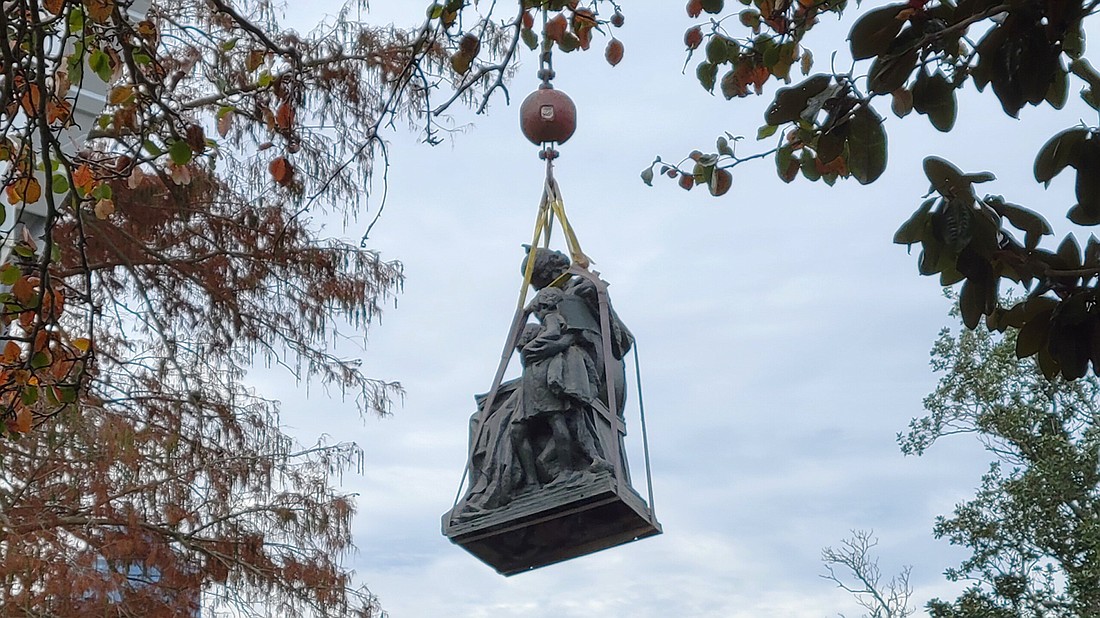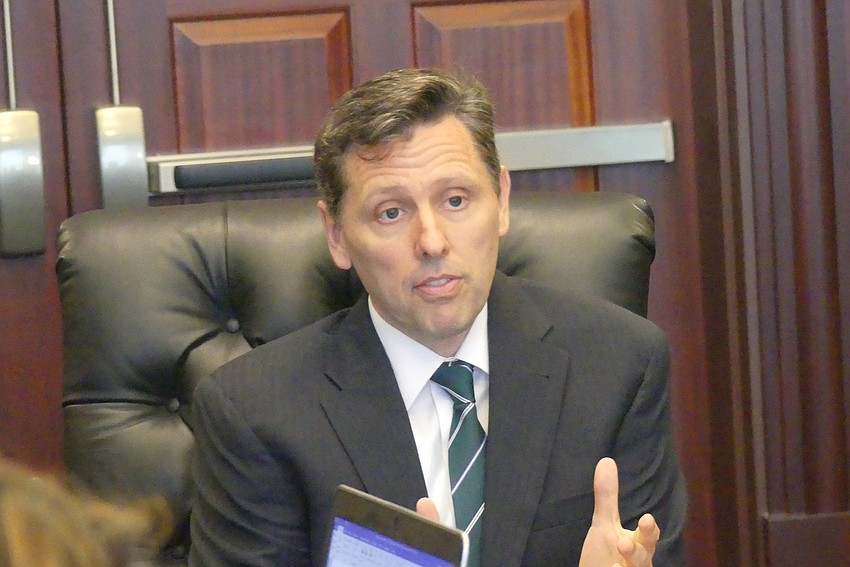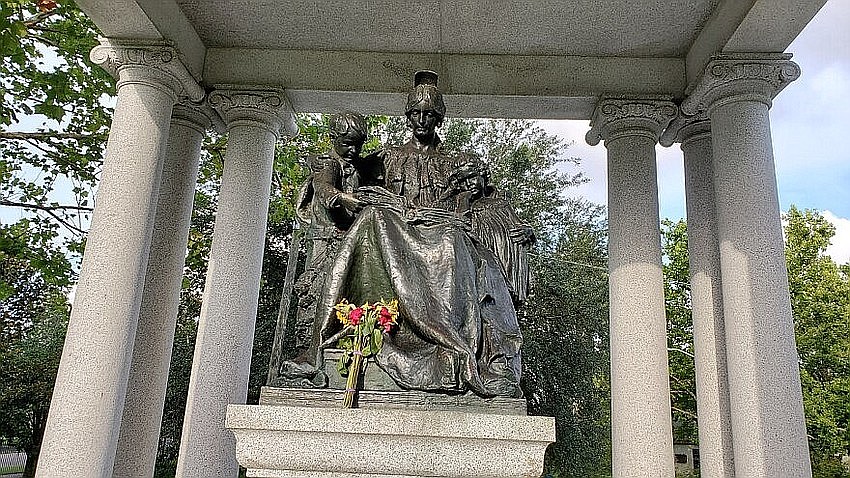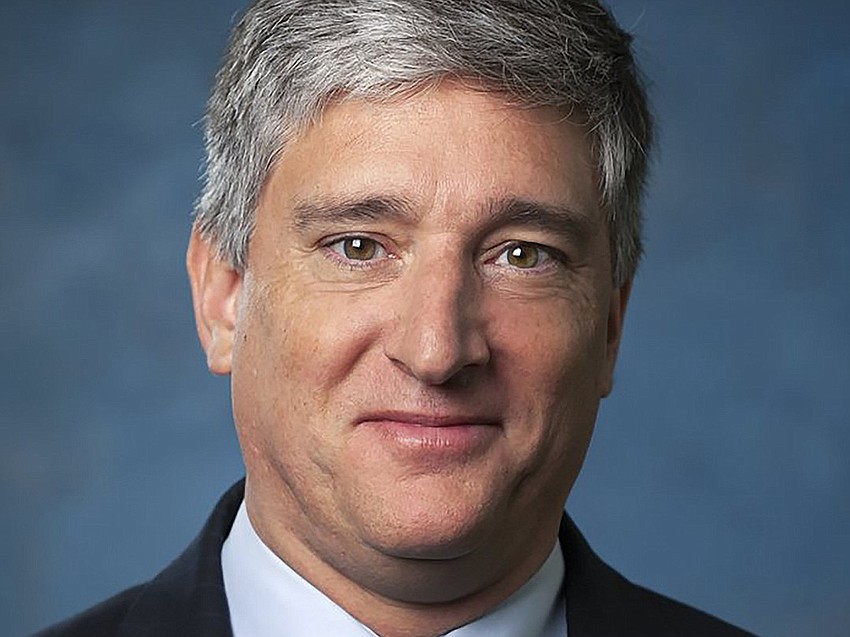
The city’s top lawyer acknowledged he made mistakes in researching his opinion on Mayor Donna Deegan’s decision to remove statues from a Confederate monument in late December.
In addition, a top Deegan aide said the administration committed a judgment error by not notifying law enforcement about the removal.
Those admissions came during a Jan. 25 City Council meeting examining the mayor’s Dec. 27 order to take down the statues from the Women of the Southland monument in Springfield Park.
Deegan’s office said she proceeded with the removal based on advice from General Counsel Michael Fackler that she could remove the statues without Council approval because the work was being paid for by private donations instead of taxpayer money.
The 2½-hour meeting included questioning members of Deegan’s staff, the general counsel’s office and other city administrators.

Several new details of the removal emerged during the meeting, including that the city spent about $900 in public funding on private security for the removal – undercutting Fackler’s contention that Council approval wasn’t needed.
Council members raised concerns that Deegan pressured Fackler into giving her a favorable opinion, with several questioning the general counsel office’s trustworthiness. The administration’s failure to alert Sheriff T.K. Waters about the removal raised concerns about whether public safety was compromised.
Now, the question is whether Council members will let the actions by Fackler and the administration be bygones or take further action.

Council President Ron Salem signaled afterward that he was ready to move on, save for an ordinance he filed this month that would require Council approval for similar actions from the mayor’s office.
“I need to hear from my colleagues – it’s not just my decision,” he said. “But I thought we had a good airing of all the issues today and I thought that was very helpful.”
Private security
Karen Bowling, Deegan’s chief administrative officer, said the administration tried not to draw public attention to the removal so workers could operate in a “stress-free environment.”
Four private security officers were hired to guard the park gate, she said, and the contractor hired an off-duty police officer to be on hand.

“Police are very, very busy. That’s why security companies exist,” she said.
In hindsight, she should have contacted Waters, Bowling said.
Waters said that had he known about the removal, he would have sent a bicycle unit, traffic control and other officers to the scene.
The monument issue has been divisive in Jacksonville and Waters said removing the statues was a potentially volatile situation where it might have taken “nothing but a small incident to create a major riot-like situation.”
Fackler said he wasn’t aware of the $900 that was spent on security until after the fact. After being questioned by Council member Joe Carlucci about how that would affect the situation, Fackler agreed to research it and report back.
Bowling said she believed the mayor’s office could obtain private donations to cover the security expense.
Council member Matt Carlucci said that although he was concerned that the administration didn’t notify Waters, he believed the other mistakes were forgivable and that the Council should let the matter rest.
“I think we’ve got a tempest in a teapot,” he said.
Historic preservation
Another issue stemmed from whether the monument had historic preservation protections that should have required Deegan’s office to obtain a certificate of appropriateness from the Historic Preservation Commission before removing the statues. The park is part of the Springfield Historic District neighborhood, which is in the National Register of Historic Places.

In Fackler’s opinion to Deegan, which he presented verbally and also issued in draft form before the Dec. 27 order, he said the monument was not protected because it was not identified as a “contributing structure” to the neighborhood’s designation.
In a written opinion requested by Salem and delivered to Council members on Jan. 16, Fackler said the monument did have protection, but only from demolition as opposed to alteration. The statues were removed from atop the monument’s cupola and within its stone columns and taken to storage, but the monument structure was left intact.
At the Jan. 25 meeting, Fackler said he should have brought in more members of the general counsel’s office and City Hall policy experts to develop his opinion to Deegan. Instead, he spoke with two other city staffers.
He attributed the flaws in his original opinion to Deegan as “my hubris in thinking that I could read the code without talking to my qualified people.”

Jason Teal, senior assistant general counsel, said he and other attorneys met with Fackler on Jan. 10 and examined the historic protections issue again.
Teal said the attorneys concluded that a certificate of appropriateness had been needed.
Two days later, Teal said, Fackler told him that he and the mayor’s office had a “difficult conversation” and that the attorneys needed to take “another look at what we were going to present in the final memo” to Salem. That final memo was the written opinion delivered Jan. 16
Council member Nick Howland, who before the meeting had accused Fackler of doing “legal gymnastics” by crafting an opinion that would support Deegan’s order, said Teal’s remarks proved his point.
“If there was any doubt that this opinion was written to justify a decision that was already made, I think this puts those doubts to rest,” he said.
Council member Kevin Carrico added that it “sounds like OGC (Office of General Counsel) folded due to political pressure from the mayor to get what they wanted.”
In an interview after the meeting, Fackler said Deegan did not pressure him to tailor his opinion to her needs. He said he stood by his opinion that Council approval was not needed.
“She told me to call balls and strikes, and that’s what I tried to do,” he said.
Contract with ACON
Also at issue was the contract with ACON Construction for removal of the statues.
The city Public Works Department submitted a request for an administrative award to ACON several days after the work was completed and it was retroactively granted. But the city’s top Procurement Division officer declared the award null and void and advised Deegan to “cure” the error by authorizing a contract with ACON.

The removal happened Dec. 27 but the Public Works Department did not submit a formal request until a week later to the Procurement Division for an administrative award to ACON. The city’s Procurement Division staff made the administrative award Jan. 3 by retroactively applying the date.
Carrico likened the situation to “asking for forgiveness instead of permission.”
Deegan’s office issued a release Jan. 23 calling the contract issue a “manufactured controversy over an administrative technicality. The release showed that contract curing had been done numerous times in recent years, including under Mayor Lenny Curry’s administration.
Deegan’s release further accused Council members of taking “political cheap shots” on the monument issue and trying to “create distractions to undermine the mayor.”
“It’s splitting hairs for political retribution and gamesmanship,” Deegan said.
“If some City Council members want to continue litigating the Civil War for their perceived political gain, that is their choice. My administration will continue moving forward from this unnecessary distraction and keep delivering on policies and projects that are good for our city.”
No-bid contracts
The meeting about the statues came two days after Council approved a measure to reduce the mayor’s power.
On Jan. 23, Council voted 12-6 in favor of an ordinance preventing the mayor’s office from acting without Council approval in approving no-bid contracts for lobbying or grant writing.
The bill was in response to Deegan approving a $300,000 single-source contract with Langton Consulting of Jacksonville in October for federal lobbying, grant writing and public policy development. Langton was a contributor to Deegan’s campaign.
“Do we think politically connected lobbying firms should be given sole source contracts in the city without our City Council oversight?” said Howland, who sponsored the ordinance. “I don’t think they should.”
Deegan’s office defended her decision, contending that Langton was the only company that could provide the full range of services needed.
Scott Wilson, the mayor’s liaison to the City Council, told Council members that the process of awarding no-bid contracts is transparently carried out in publicly noticed meetings by city procurement officials.
The issue sparked a pointed and largely partisan debate among Council members.
Jimmy Peluso, a Democrat, called the legislation a solution to a nonexistent problem. He said opponents of Deegan, also a Democrat, were carrying out a “witch hunt” and were “making hay” politically. Howland is a Republican.
Of the six “no” votes, Matt Carlucci was the only Republican.
Carlucci said the ability of the mayor to act on single-source contracts was in place to allow the administration to quickly address urgent needs, such as ordering lobbying services to combat state legislation that would affect the city’s tax revenues.
Raising the possibility that his colleagues on the Council might seek higher office, he said, “If you’re mayor, you’re going to want this tool back.”